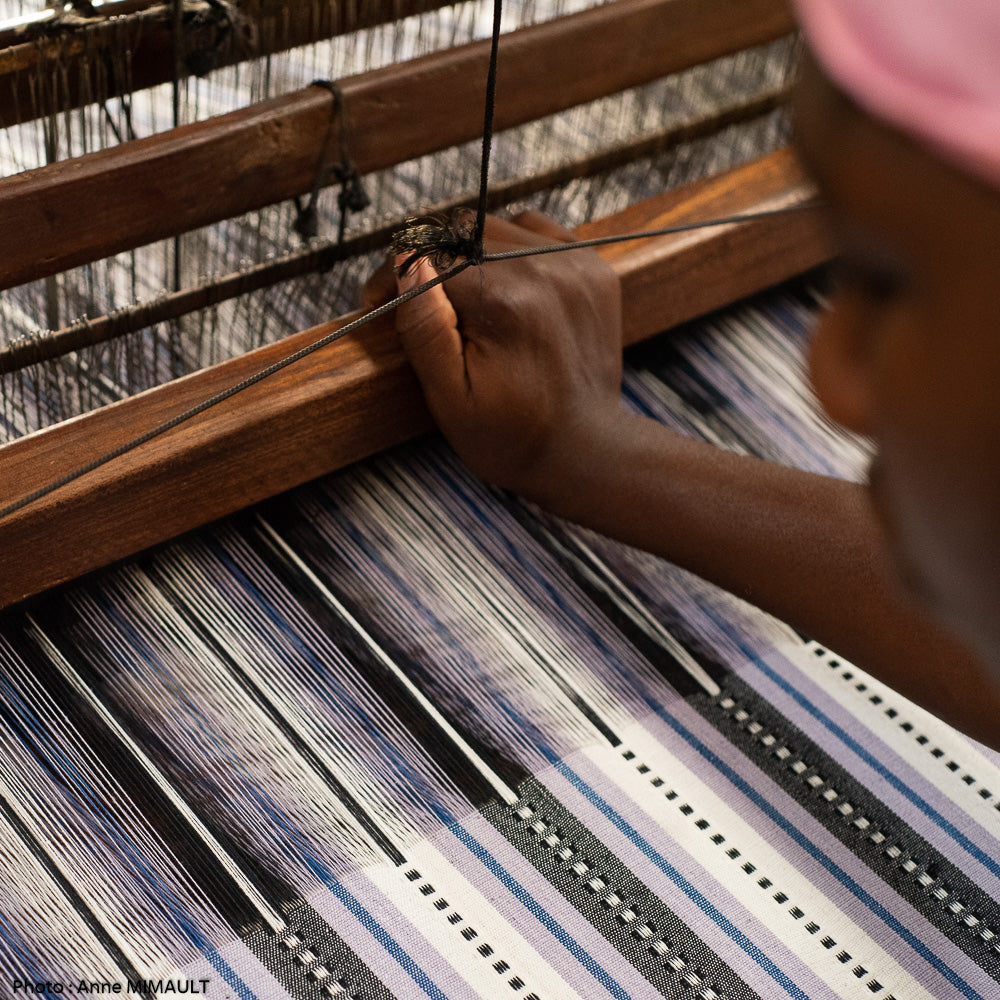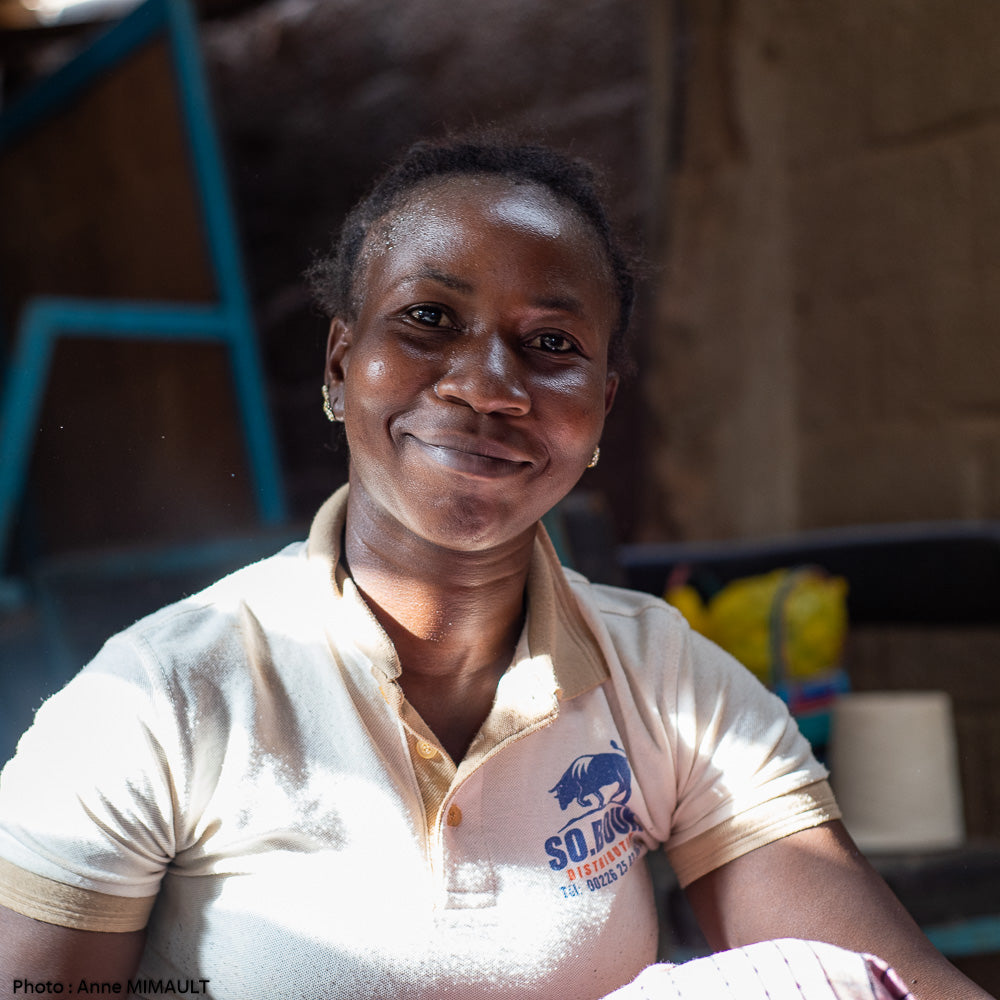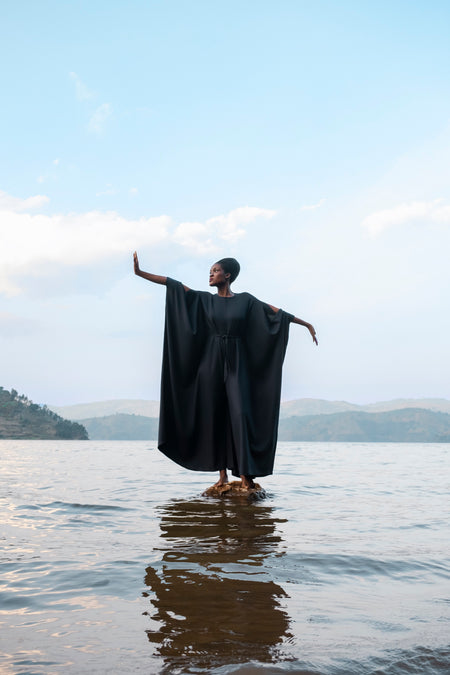Ethical Fashion with Cabes

The Jabali coat from Asantii’s debut collection is a true reflection of the brand’s ethos. First, there’s the name – Jabali means ‘strong’ in Swahili, which is how this statement piece will make you feel. Then there’s the design, its clean, oversized proportions ensuring it is effortless to wear. Let’s also consider where it was constructed, at Asantii’s dedicated production hub in Kigali, Rwanda. But most striking of all is the distinctive loom-woven Faso Dan Fani fabric it is crafted from, which Asantii developed with Cabes (Commerce, Artisanat pour le Bien Être Social), a social enterprise active across Burkina Faso, Côte d’Ivoire and Benin that expertly produces this storied West African textile.
“As an African brand it’s essential to get the textiles right and what Cabes does is very much in line with Asantii’s attention to high quality, authentic materials,” says Jessica Wade from Asantii’s design team.
“The piqué is so intricate, the floating threads appears almost like an embroidery, and our bespoke stripe design so striking that we’ve opted for a simple silhouette that shows off just how nice the fabric is. We think it’s a piece to be proud of.”.
Cabes was established in 2014 in partnership with the Ethical Fashion Initiative (EFI), a program of the International Trade Centre dedicated to building sustainable fashion practices in emerging economies. It has since brought together 50 women-led associations and 2,000 artisans and benefits its members by providing equipment, facilities and training as well as supporting sales, exports and logistics. This has enabled Cabes to reach luxury clients including Lukhanyo Mdingi, Studio 189, Loewe, Wales Bonner and Vivienne Westwood as well as United Arrows and Camper. The draw is not only the brilliance of its fabrics but also that Cabes is committed to using GOTS (Global Organic Textile Standard) certified dyes and cottons, and applies an exacting code of conduct based on international labour conventions and the UN’s Sustainable Development Goals.
Burkina Faso is one of Africa’s biggest cotton producers and renowned for its textile traditions, especially Faso Dan Fani, which means ‘the fabric woven at home’ in the Dioula language. “What I find powerful about Faso Dan Fani is that it is not a dead heritage or something reserved to the upper class or foreign customers. It is really the pride of a nation and people wear it for special occasion as well as for everyday life,” says Oceane Joncoux, project manager at Cabes/EFI. “Weaving used to be a man’s job in the region ¬– and that’s still mostly the case in Côte d’Ivoire, Ghana and Mali – but after Burkina Faso achieved independence in 1984, its first president, Thomas Sankara, put women to work and every home had a small loom.” Pascaline Ouedraogo, a Cabes weaver in the capital city, Ouagadougou, agrees: “Faso Dan Fani is part of our identity. You can spot a Burkinabé from a mile away just by the clothes he wears.”
The making process is complex and one that Cabes has full oversight of. It begins with acquiring the raw organic cotton from local farmers, which is ginned and spun, either by hand or by machine, then dyed using natural dyes, before the spooled yarn pass to the weavers. It takes up to 10 days to prepare the loom by winding, wrapping and passing 3,000 threads onto it frame using a comb. Each artisan can then weave around two metres a day, which once complete, will go through rigorous quality control.
Cabes has innovated their fabrics by introducing a wider loom, which has broadened its commercial appeal, and is currently focussed on capacity development. “We are in the process of setting up a dyeing unit and in-house workshop of 11 looms before the end of 2022,” says Cabes manager Karfa Yacoro.
Mariam Maiga, President of AZPF, one of Cabes’ founding associations, asserts that Cabes is changing lives and building futures. “The philosophy that we tell women all the time is that we are not here to do charity. Each woman has 10 fingers, and her own mind, and she is here to work. When they line up at the end of the month to take their wages, it’s so beautiful,” she says. “We do quality weaving and our products sell out because the emphasis is on creativity. Every woman is a designer, and together, we keep improving our product.”
Its impressive Fasso Dan Fani catalogue ranges from classic stripes through to checks, piqué, seersucker, ikat and even houndstooth. For the Jabali coat, Asanti was drawn to a varied stripe and made it unique through a bespoke colour palette of soft orange, navy, pale blue and pink finished with off white needlework. We love the spirit of unity it exudes, making the fabric a very special addition to this collection. Expect to see more Faso Dan Fani designs in future offerings, as well as pieces made from some of the other textiles that Cabes produces including indigo resist-dyed cotton and Bogolan, Mali’s famous hand painted mud cloth. “We plan to continue to develop new bespoke fabrics with Cabes. We view them as a great partner.” says Jessica, of Asantii’s ongoing and meaningful relationship with Cabes. “They have so much to offer. All of their fabrics are so stunning that we want to savour each one.”
Words by Helen Jennings

Cabes has innovated their fabrics by introducing a wider loom, which has broadened its commercial appeal, and is currently focussed on capacity development. “We are in the process of setting up a dyeing unit and in-house workshop of 11 looms before the end of 2022,” says Cabes manager Karfa Yacoro.
“Thanks to these textiles, women can care for their families, improve their living conditions and make investments. Also, there’s the satisfaction of knowing that their work is being sold and appreciated around the world.”.
Mariam Maiga, President of AZPF, one of Cabes’ founding associations, asserts that Cabes is changing lives and building futures. “The philosophy that we tell women all the time is that we are not here to do charity. Each woman has 10 fingers, and her own mind, and she is here to work. When they line up at the end of the month to take their wages, it’s so beautiful,” she says. “We do quality weaving and our products sell out because the emphasis is on creativity. Every woman is a designer, and together, we keep improving our product.”
Its impressive Fasso Dan Fani catalogue ranges from classic stripes through to checks, piqué, seersucker, ikat and even houndstooth. For the Jabali coat, Asanti was drawn to a varied stripe and made it unique through a bespoke colour palette of soft orange, navy, pale blue and pink finished with off white needlework. We love the spirit of unity it exudes, making the fabric a very special addition to this collection. Expect to see more Faso Dan Fani designs in future offerings, as well as pieces made from some of the other textiles that Cabes produces including indigo resist-dyed cotton and Bogolan, Mali’s famous hand painted mud cloth. “We plan to continue to develop new bespoke fabrics with Cabes. We view them as a great partner.” says Jessica, of Asantii’s ongoing and meaningful relationship with Cabes. “They have so much to offer. All of their fabrics are so stunning that we want to savour each one.”
Words by Helen Jennings






